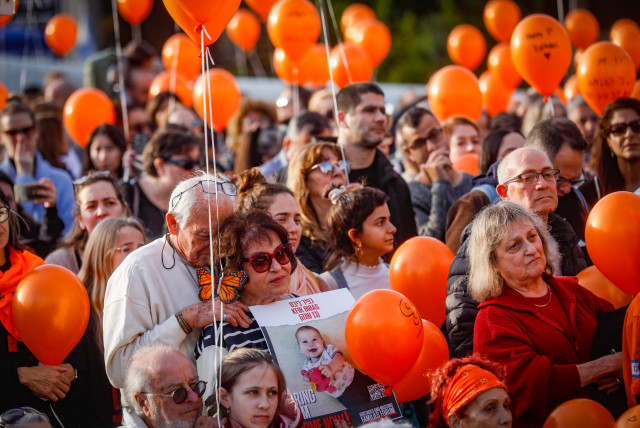My Word: A nation of births

In short, having babies comes naturally in Israeli society. Or almost naturally. Israel also has the highest rate of fertility treatments in the world for both couples and single women.
It’s Israel’s growth industry. Babies. There’s no escaping it, wherever you go in the country there are noisy, lively signs that Israel is bucking the worldwide trend of a drop in the birthrate. Eight months into the war triggered by the Hamas invasion and mega-atrocity on October 7, the local birthrate shows no signs of slowing down. And you don’t need an overly fertile imagination to foresee a post-war baby boom.
Here’s a pregnant pause for thought: My son’s IDF battalion, comprised mainly of reserve soldiers, proved to be the record-holders in the fathering field. During five months of emergency military call-up, between October and March, the wives of no fewer than 20 battalion members gave birth. Talk about babes in arms: It’s hard to imagine that figure in any other army in the Western world.
My own minyan of prayer-goers, still gathering in a local park four years after we began outdoor services during COVID, also had a boost in tiny congregants. When the majority of reservists returned from their (first) round of service, a kiddush was held in their honor; to remember a young father-of-two who fell in Gaza; and above all drink Le’chaim! (“To life!”) to the many families whose numbers had been boosted by babies in the previous months.
Some of the births have been particularly poignant. There was general euphoria this week at the successful rescue of four Israeli hostages being held by terrorists in Gaza – Noa Argamani, Shlomo Ziv, Almog Meir Jan, and Andrey Kozlov – but there are captives whose wives have given birth alone, not knowing whether their husbands are alive or dead, whether their children will ever get to hug their fathers.
The wife of paramedic Dolev Yehud, whose charred remains were only finally identified last week, gave birth to their fourth child just 16 days after he was killed on October 7.
Tsuf Eshchar is another remarkable war widow. In a typical act of courage and love, she extended an open invitation to the circumcision of her third son last month in Jerusalem, where some 1,000 people turned up. (The circumcision ceremony was organized by the Gvura Forum, representing bereaved families demanding continued IDF action until Hamas is defeated).
It was a celebration and commemoration. The newborn’s father, 33-year-old Rabbi Naaran Eshchar, died of wounds received in active service on the northern border in November. Eshchar, who taught at the Jordan Valley hesder yeshiva at Shadmot Mehola, was one of the country’s quiet heroes.
A few months before his death, he had donated a kidney to a stranger, and although he was exempt from reserve duty while fully recuperating, he insisted on going back to service in the wake of the October 7 mega-atrocity.
His family donated more organs after his death, thus Rabbi Eshchar lives on not only through his children, including the son he never saw, but also through all those who received his kidneys, lungs, heart, and liver.
Incidentally, Israel leads the world in the number of altruistic kidney donations, surpassing 30 live donors per million according to World Health Organization figures. It should not come as a surprise – despite the political divisions, there is still a powerful social cohesion.
I’m aware that this combination of national pride, high birthrate, and willingness to serve in the military sounds not only old-fashioned but vaguely threatening to the rest of the Western world. Elsewhere, births have plummeted to below replacement level, and citizens do everything they can to flee a country at war, whereas Israelis are obsessed with babies and will do anything possible to get a flight home and join their units, or volunteer on the home front when war breaks out. I’d rather live in Israel.
It seems we have more luck making babies than making peace. During the First Gulf War, as Scuds from Saddam Hussein’s Iraq struck Israel, sexologist Dr. Ruth Westheimer became a legend for her suggestions on what to do in sealed rooms. Given the spike in births nine months later, her advice was good or at least encouraging.
A look at international news outlets shows a certain anxiety about the drop in global fertility rates. A recent edition of the Economist noted: “The world faces a shortage of babies. Among rich countries, only Israel is having enough children to stop its population from shrinking, and in most places birth rates are falling. As a consequence, the great and the good are growing worried.”
Israel's lead in birth rates
According to the Central Bureau of Statistics data for 2023, the average number of children a woman in Israel will have is 2.89, compared to the OECD’s 1.58. Among Jewish Israeli women, the rate is 3.1. Among the oft-cited reasons for this phenomenon is a national desire to make up for the six million Jews who perished in the Holocaust. But people don’t have babies because of the past, they have them because they believe in the future.
A friend of mine once joked that if Israelis were to wait until they could afford children to start having them, there would be a zero birthrate. But that doesn’t happen. As a Taub Center report from 2019 noted: “Israel’s fertility is not only exceptional because it is high. It is also exceptional because strong pronatalist norms cut across all educational classes and levels of religiosity, and because fertility has been increasing alongside a rise in the age at which women first give birth and increasing education levels – at least in the Jewish population. From an international perspective, these are extremely unusual patterns.”
In short, having babies comes naturally in Israeli society. Or almost naturally. Israel also has the highest rate of fertility treatments in the world, for both couples and single women. And surrogate babies are common in the gay community. At the start of the war, so many bereaved families wanted the chance of having a posthumous child from a fallen son or husband that the Health Ministry streamlined the time-sensitive process of requesting sperm retrieval.
Those people who do not have children, for whatever reason, tend to be part of extended families – and never underestimate the value of a beloved aunt or uncle, biological or adopted.
At the same time that Israelis are busy having babies, “progressive” countries are sliding ever further down the slippery slope of medically assisted suicides. In a list of countries that includes Holland, Belgium, Switzerland, New Zealand, Australia, and Canada, among others, ending life through euphemistically named Medically Assistance in Dying (MAID) is on the rise.
According to The Guardian, some 4.1% of deaths in Canada are now through MAID, and while the vast majority remain patients suffering from painful terminal illnesses, at least one cited hearing loss as the reason for a euthanasia request (which was granted). In at least four cases, Veteran Affairs Canada found that MAID was “inappropriately suggested,” according to the Guardian report. Again, despite the trauma of October 7, I’d rather live in Israel.
During the October 7 invasion, Hamas, Islamic Jihad, and other terrorists carried out the biggest and most barbaric attack on Jews since the Holocaust. Some 1,200 were slaughtered and 250 abducted. The victims included babies burned to death and beheaded in their homes in pastoral kibbutzim. Kfir Bibas, whose first birthday was marked in January, is the youngest hostage in the world. He was kidnapped along with his mother and four-year-old brother. His father was abducted separately. Their fates remain unknown.
Hamas could end the war in Gaza by releasing the hostages – including baby Kfir and his family – and not launching rockets on Israel. But since October 7, there has been a huge rise in antisemitism around the world with Israelis and Jews routinely being subjected to slurs of being “baby killers.”
Ignoring the fact the IDF makes every effort (increasing its own risk) to avoid hurting the children deliberately exploited as human shields by Hamas, the UN plans to include Israel on a blacklist of offenders, alongside ISIS and the Taliban. As author Howard Lovy posted on X: “I’m still amazed at how easily the world believes everything mass murderers and rapists say because the alternative would be to believe Jews.”
It is not by chance that Israel’s national anthem is “Hatikvah,” “The Hope.” And that is the essence of the baby boom in the Jewish state. We have babies because they represent hope and the future. Despite everything, life goes on.
Jerusalem Post Store
`; document.getElementById("linkPremium").innerHTML = cont; var divWithLink = document.getElementById("premium-link"); if (divWithLink !== null && divWithLink !== 'undefined') { divWithLink.style.border = "solid 1px #cb0f3e"; divWithLink.style.textAlign = "center"; divWithLink.style.marginBottom = "15px"; divWithLink.style.marginTop = "15px"; divWithLink.style.width = "100%"; divWithLink.style.backgroundColor = "#122952"; divWithLink.style.color = "#ffffff"; divWithLink.style.lineHeight = "1.5"; } } (function (v, i) { });

